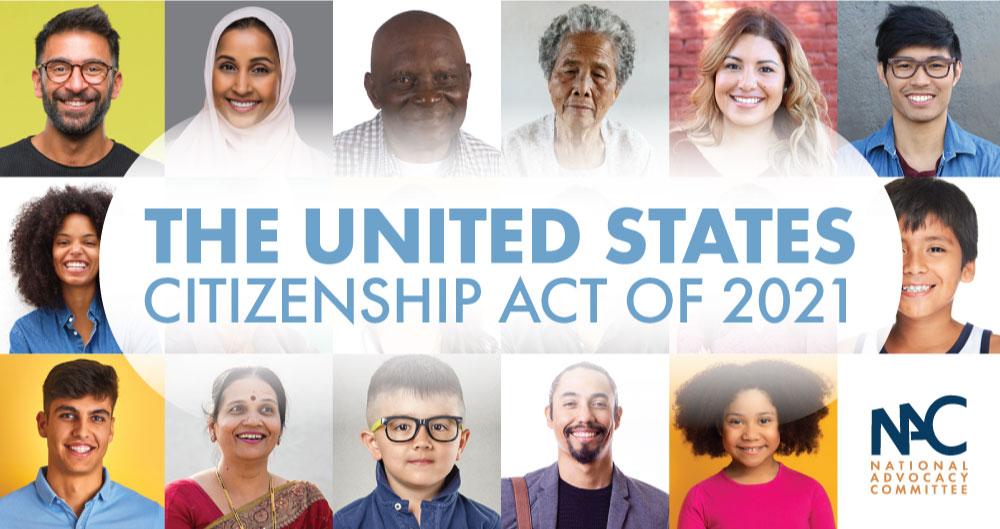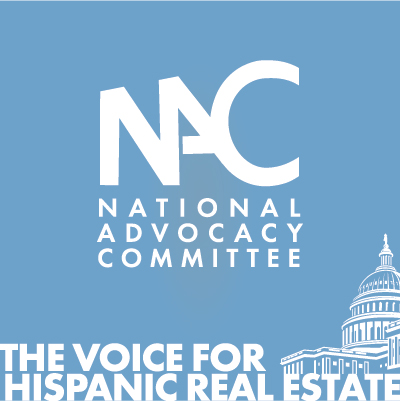The time to pass Comprehensive Immigration Reform starts now.
Celebrating NAHREP familia, cultura, politics, and grassroots action
February 25, 2021
Qué onda mi gente?!
The U.S. Citizenship Act of 2021 was released last week by Senator Bob Menendez in the Senate and U.S. Representative Linda Sanchez in the House of Representatives. We’ve waited for this moment for a long time familia, a real shot at passing comprehensive immigration reform. If you look at every single one of our State of Hispanic Homeownership Reports, you’ll find that passing a sweeping immigration bill has been a consistent cornerstone of our policy priorities for the past decade. You may ask, what does immigration have to do with housing and advancing sustainable Hispanic homeownership? Everything.
Comprehensive immigration reform will be critical to sustaining our aging population and workforce, two things necessary for a vibrant housing market and long-term economic growth. Second, a severe labor shortage in the construction industry is driving up the cost of building homes and exacerbating our housing inventory shortages. And lastly, a path to citizenship creates stability for mixed-status Latino families, a critical component of homeownership.

The U.S. Citizenship Act of 2021 is critical to U.S. economic growth
Immigrants are a growing part of the American labor force, with foreign-born workers making up 17% of the work force and undocumented immigrants comprising approximately 4.4%. The U.S. relies on immigrant workers in many sectors of the U.S. economy, including service occupations, healthcare, construction and maintenance, production and transportation, management, sales, information technology, and high-tech manufacturing. An estimated five million undocumented workers are serving in essential roles as front-line workers during the pandemic – from healthcare to transportation to agriculture to food services and delivery. They have risked their lives under the worst of circumstances to help serve and protect American communities in a time of crisis.
- Passing the U.S. Citizenship Act of 2021 would boost our economy
- Passing comprehensive immigration reform benefits all workers by increasing productivity, creating new jobs, raising workers wages, and reducing the deficit. It would increase the labor force by 3.5 percent in 2023 and 5 percent in 2033, which will boost capital investment and lead to increased productivity and higher overall average wages.
- The Congressional Budget Office (CBO) estimated it would increase real Gross Domestic Product (GDP) by $700 billion in 2023 and $1.4 trillion in 2033.
- Approximately 3.2 million immigrants are business owners, or one in every five entrepreneurs in the country. Immigrant-owned businesses employ nearly 8 million Americans and generate $1.3 trillion in total sales.
- Passing the U.S. Citizenship Act of 2021 would support our labor market
- Clears backlogs: The bill clears the employment-based immigrant visa backlog and alleviates lengthy wait times for individuals by eliminating employment-based per country limits.
- Increases lower skilled job visas: The annual number of immigrant visas for lower-skilled jobs would increase from 10,000 to 40,000, which will expand opportunities for people to obtain green cards to work in the dairy, meat, and poultry processing industries, as well as in child care and elder care.
- Stimulates regional economic development: It gives the Department of Homeland Security authority to establish a 5-year pilot program to allow any county or municipal executive to petition for additional immigrant visas to support the region’s economic development strategy, provided employers in those regions certify there are available jobs and that there are no workers to fill them. This will be critical to construction labor shortages that is impacting housing production.
- Passing the U.S. Citizenship Act of 2021 creates an earned roadmap to citizenship for undocumented individuals.
- The bill allows undocumented individuals to apply for temporary legal status, with the ability to apply for green cards after five years if they pass criminal and national security background checks and pay their taxes.
- Dreamers, TPS holders, and immigrant farmworkers who meet specific requirements are eligible for green cards immediately under the legislation. After three years, all green card holders who pass additional background checks and demonstrate knowledge of English and U.S. civics can apply to become citizens. Applicants must be physically present in the United States on or before January 1, 2021.
- Oh and, please, undocumented immigrants are NOT aliens. Lastly, the bill further recognizes America as a nation of immigrants by changing the word “alien” to “noncitizen” in our immigration laws.
- Passing the U.S. Citizenship Act of 2021 keeps families together.
- Aside from clearing backlogs, recapturing unused visas, eliminating lengthy wait times, and increasing per-country visa caps, it also eliminates the so-called “3 and 10-year bars,” and other provisions that keep families apart.
- Lastly, the bill allows immigrants with approved family-sponsorship petitions to join family in the United States on a temporary basis while they wait for green cards to become available.
Reuniting families and providing long-term stability is core to advancing homeownership opportunities for Latinos. Currently, an estimated 3.76 million people with approved family-sponsored petitions are waiting for an immigrant visa to become available, sometimes for up to 20 years, in order to lawfully reunify with their family members in the United States.
When people say things like wait in line, waiting in line means 20 years for many families! Approximately 1.6 million undocumented immigrants are married to U.S. Citizens and an estimated 4.4 million U.S. citizen children have at least one parent who is undocumented. The US Citizenship Act provides a clear pathway to citizenship for these individuals.
Now it’s time for you to take action!
Today we launch our campaign to pass the U.S. Citizenship Act of 2021. Don’t expect this to be easy. It will require NAHREP to truly flex their advocacy muscles and show up in droves. As the largest Latino business organization in the country, committed to American economic advancement, if we don’t speak up then who?
Let’s show the country what we’re made of. I’ll see you at the finish line mi gente. When we pass this, it will be a pachanga for the ages.

About Noerena Limón
Noerena Limón is NAHREP’s Executive Vice President of Public Policy and Industry Relations. Noerena heads the organization’s policy and advocacy efforts on issues ranging from homeownership, housing inventory, credit access and immigration.
Prior to joining NAHREP, Noerena spent six years at the Consumer Financial Protection Bureau (CFPB) and served as a political appointee under President Obama in the White House Office of Political Affairs.




